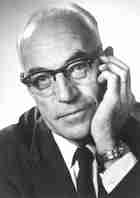
 Good
Bye, Sir Eccles
Good
Bye, Sir Eccles
Dr. Elson de Araújo Montagno,
MD, PhD
eamontagno@yahoo.com.br

 Good
Bye, Sir Eccles
Good
Bye, Sir Eccles
Dr. Elson de Araújo Montagno,
MD, PhD
eamontagno@yahoo.com.br
Sir John C. Eccles (1903 - 1997) has died on May 2nd, 1997. He worked "under the enchantment of the synapses" during the first part of his life, and has helped the understanding of the brain, the most important of mysteries. He lived his last days researching "brain connections", and now he went on to meet the universal mind, to experience the passage.
When he was 18 years old, Eccles started his scientific life in Melbourne, Australia, still as a student of medicine. He passionately dedicated himself to the brain-mind problem, specially about the question on self-consciousness, on the experience of ourselves. At that time, he seemed to understand that the specialized connections between nervous cells, which Sherrington called synapses, held the clue not only to the elucidation of the subtle nervous reactions, but also to the brain-mind problem.
He studied for three years in Oxford with Sherrington, while this British gentleman was the most important neurophysiologist in the world. He was then a 22 years old Rhodes scholar, recently graduated in Melbourne.
The young Australian neuroscientist dedicated himself to the scientific research on the communication between nervous cells: "fast, reliable, unlimited: the most amazing of the nervous system's capabilities." However, he found little information about the biophysics of the nervous cells' membrane, the permeability to ionic flow that culminates in the nervous impulse.
The best known way of communication between nervous cells is through a connection called synapses. There was a great controversy about the transmission through the synapses, if it could be electrical or chemical.
John Eccles, one of the first proponents of the electrical hypothesis, described in 1951 the experiences with intracellular recordings, which had persuaded him to abandon the electrical hypothesis in favor of the chemical hypothesis. Eccles is successful even when he scientifically refutes his own former idea, instead of assuming it as a failure, and the fact of working with an equivocated hypothesis. For that, in 1963 he received the Nobel Prize for his studies on the transmission of nervous impulses through the synapses. He became since then, the world's most important neuroscientist and continued to be so for the following decades.
In 1983, during a meeting at the Swiss-Austrian-German border, I shared a few days with Eccles, then 80 years old. He impressed me with his sharp mind and his strong body. His eyes, transparent with the light shed by his shining spirit, expressed his search for the truth, and all the strength of his consciousness, of someone who knew the most about his own brain.
The scientist of the biggest of the mysteries now dives into another, perhaps still greater a mystery. Enthralled by what he has shown about ourselves, we respectfully say: Good bye, Sir John Eccles!
Elson de Araújo Montagno is a neurosurgeon, doctor in Medicine by Free University of Berlim, ex-visiting professor of Harvard University and ex-professor of the School of Medical Sciences from the State University of Campinas. Email: montagno@internetional.com.br
![]()
Published by: The Center For Biomedical Informatics
Copyright 1997 Universidade Estadual de Campinas